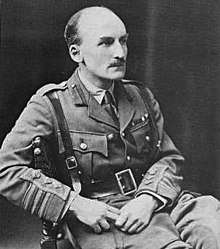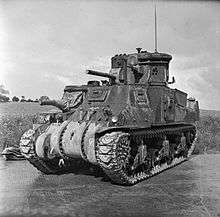
In 1919 I was the sole person who saw war in the form it would be; yet saw it only as an acorn and not as an oak.

Major-General JFC Fuller, the man credited with developing modern armored warfare in the 1920s, called failure to use It "the greatest blunder of the whole war." He even suggested that British and American tank divisions could have overrun Germany before the Russians – if it had been deployed, that is. ~ As qtd. by David Hambling
Major-General John Frederick Charles Fuller, CB, CBE, DSO (September 1, 1878 – February 10, 1966), commonly J.F.C. Fuller, was a British major-general, military historian and strategist, notable as an early theorist of modern armoured warfare. He was also the inventor of "artificial moonlight" and an occultist.
Quotes
- In 1919 I was the sole person who saw war in the form it would be; yet saw it only as an acorn and not as an oak.
- Quoted in Men Against Fire. S.L.A. Marshall (1947), p. 27.
- An absolute doctrine is impossible, for once a doctrine and its articles become dogma, woe to the army which lies enthralled under its spell.
- Quoted in Men Against Fire. S.L.A. Marshall (1947), p. 107.
- What thrust us into war were not Hitler's political teachings: the cause, this time, was his successful attempt to establish a new economy. The causes of the war were: envy, greed, and fear.
- The Second World War, 1939-1945: a strategical and tactical history, (1948).
- The War of the Roses in England and the Civil War in America were both internal conflicts arising out of similar ideas. In the first the clash was between feudalism and the new economic order; in the second, between an agricultural society and a new industrial one. Both led to similar ends; the first to the founding of the English nation, and the second to the founding of the American. Both were strangely interlinked; for it was men of the old military and not of the new economic mind—men, such as Sir Humphrey Gilbert and Sir Walter Raleigh — who founded the English colonies in America.
- Grant and Lee: A Study in Personality and Generalship, ch. 1 (1957).
Attributed
- Everyone was talking and chatting, when slowly came into sight the first tank I ever saw. Not a monster but a very graceful machine with beautiful lines.…Here was the missing tool of penetration, the answer to the dominance on the battlefield of small-arms fire.
- Stephan Wilkinson, “J.F.C. “Boney” Fuller – Wacko Genius of Armored Warfare”, History.net.
About J. F. C. Fuller
- It might have been the greatest lost weapon of World War II. Major-General JFC Fuller, the man credited with developing modern armored warfare in the 1920s, called failure to use it "the greatest blunder of the whole war." He even suggested that British and American tank divisions could have overrun Germany before the Russians – if it had been deployed, that is.
- As qtd. in David Hambling, "Secret Strobelight Weapons of World War II", Wired, (22 October 2012).
- Major General John Frederick Charles Fuller was, during World War I and through the early 1930s, the British army’s tank warfare go-to guy. He was the man who taught the Wehrmacht how to blitzkrieg, George Patton how to rumble and the Israelis how to kill Syrians.
- Stephan Wilkinson, “J.F.C. “Boney” Fuller – Wacko Genius of Armored Warfare”, History.net.
- Fuller’s finest wartime moment was the promulgation of his Plan 1919. Believing World War I would continue into 1919, he suggested victory with a single penetrating, surprise, mass tank attack aimed not at killing lots of German soldiers but at reaching and killing the enemy “brain”—the rear-area command-and-communications infrastructure—and thus paralyzing the body. But Fuller’s most meaningful tactical concept came to naught, as the war ended in November 1918. Had it continued, Fuller today might be as widely known as Guderian, Montgomery and Patton.
- Stephan Wilkinson, “J.F.C. “Boney” Fuller – Wacko Genius of Armored Warfare”, History.net.
- In the early 1930s he predicted, as Anthony Trythall wrote, “future armies would be surrounded by swarms of motorized guerillas, irregulars or regular troops making use of the multitude of civilian motorcars that would be available.” Fuller also mused that one day “a manless flying machine” would change the face of war. Early on he was intrigued by the development of radio, not only for communication but also as a way to control robot weapons. He also thought then-primitive rocket technology would one day lead to the development of superb anti-aircraft weapons.
And as early as the 1920s, Fuller was a proponent of amphibious warfare. He envisioned a naval fleet “which belches forth war on every strand, which vomits forth armies as never did the horse of Troy.” Indeed, he foresaw future navies as being entirely submersible. On the negative side of the balance sheet, Fuller also championed the military use of poison gas, particularly when spread by airplanes. Even as late as 1961, with the publication of his book The Conduct of War, he blamed resistance to chemical warfare on “popular emotionalism.”
If Fuller had a fatal flaw as a tactician, it was that he derided the importance of putting infantry “boots on the ground.” To him, combat was simply a matter of wool uniforms versus steel armor—and that seemed to him a no-brainer. Of course, Fuller had failed to consider the development of portable, shoulder-fired and helicopter-borne antitank weaponry.- Stephan Wilkinson, “J.F.C. “Boney” Fuller – Wacko Genius of Armored Warfare”, History.net.
External links
- The Star in the West
- The Foundations of the Science of War hosted by U.S. Army Command & General Staff College
- Generalship: Its Diseases and Their Cure hosted by U.S. Army Command & General Staff College
This article is issued from
Wikiquote.
The text is licensed under Creative
Commons - Attribution - Sharealike.
Additional terms may apply for the media files.